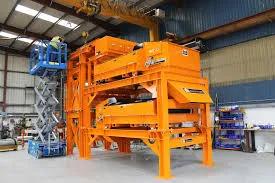

Desemba . 04, 2024 09:37 Back to list
The Importance of Scrap Metal Recycling Plants
In an age where sustainability and environmental responsibility are more critical than ever, scrap metal recycling plants play a vital role in the circular economy. These facilities help divert valuable metal resources from landfills, reduce energy consumption, and minimize environmental impact. As a result, they not only contribute to waste reduction but also promote a more sustainable and efficient economy.
Scrap metal recycling involves collecting, processing, and reusing metals from discarded products and materials. This process can include everything from old cars, appliances, and construction debris to industrial waste. In a typical recycling plant, these metals are sorted, cleaned, and melted down to produce new metal products. This recycling process significantly differs from producing new metals from raw ores, which can be energy-intensive and environmentally damaging.
One of the most significant benefits of scrap metal recycling is the conservation of natural resources. Mining for metals consumes vast quantities of water and energy, and it often results in habitat destruction and pollution. By recycling metals, we can reduce the need for mining, thereby preserving natural ecosystems and reducing our environmental footprint. For instance, recycling aluminum saves up to 95% of the energy required to produce new aluminum from raw bauxite ore. This energy conservation translates to lower greenhouse gas emissions, making recycling a crucial tool in combating climate change.
The role of scrap metal recycling plants extends beyond environmental benefits. They are also significant contributors to the economy. The recycling industry creates jobs in various sectors, including collection, processing, and sales. These plants often require skilled workers for operating machinery, managing logistics, and ensuring safety protocols. Additionally, the economic impact of recycling goes beyond direct employment. By creating a market for recycled materials, these plants stimulate local economies and reduce reliance on expensive raw materials.

Furthermore, recycling plants foster innovation and technological advancement. As the demand for recycled metals grows, so does the need for more efficient recycling processes. Many plants invest in cutting-edge technology that improves sorting, processing, and recovery rates. This investment not only enhances the efficiency of metal recovery but also drives innovation in adjacent fields. For example, advancements in automation and robotics in recycling facilities can lead to improvements in safety and productivity, setting a precedent for other industries.
Education and awareness are also essential components of successful scrap metal recycling. Many recycling plants engage with communities to promote the importance of recycling and provide resources for proper disposal methods. By highlighting the environmental and economic benefits, these plants help to cultivate a culture of recycling and responsible resource management. Community engagement can also lead to increased collection rates of scrap metals, making the recycling process more efficient and effective.
However, challenges remain within the industry. Fluctuations in the global metal market can affect the viability of recycling operations, and regulatory hurdles can complicate processes. Additionally, illegal dumping and improper disposal of metals can undermine the efforts of recycling facilities. To combat these issues, collaboration among governments, businesses, and communities is essential. Policies that support recycling initiatives and promote sustainable practices can create a more favorable environment for scrap metal recycling plants.
In conclusion, scrap metal recycling plants are crucial in fostering a sustainable future. By recycling metals, we conserve natural resources, reduce energy consumption, and minimize environmental impacts. Additionally, these plants contribute to economic growth, community engagement, and technological innovation. As we face the increasing challenges of climate change and resource depletion, supporting and expanding the recycling industry will be vital for achieving a more sustainable and circular economy.
Latest news
Metal Shredder: Key Equipment For Resource Recycling And Sustainable Environmental Development
NewsMay.06,2025
Metal Recycling Plants' Processing and Classification of Recyclable Materials
NewsMay.06,2025
Eddy Current Separator: Improve The Process Efficiency Of Recycling, Mining, And Manufacturing Industries
NewsMay.06,2025
Comparative Analysis Of Air Separation And Vibration Technology In Cable Granulation
NewsMay.06,2025
Application of Cable Granulator in Cable Recycling and Its Environmental Significance
NewsMay.06,2025
Aluminum Shredder: A Powerful Tool For Resource Recycling And Environmental Protection
NewsMay.06,2025